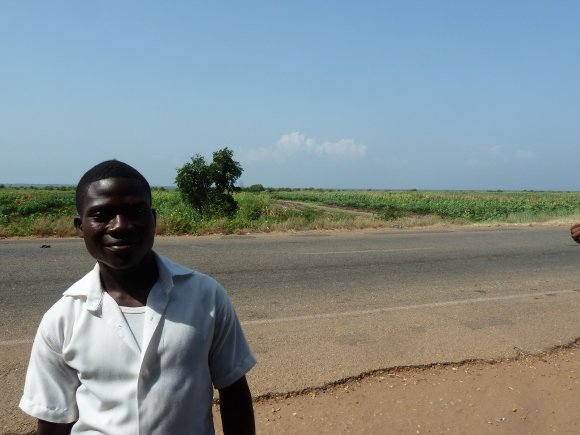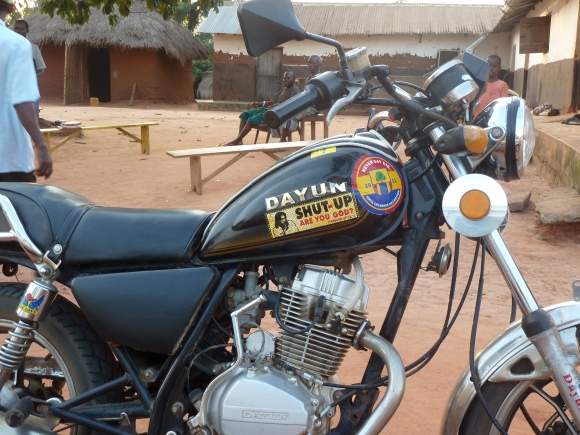As I write this, I can hear frantic drumming in the distance. It’s soothing. Don’t get the wrong idea though. This is 21st century Africa. So far, my soundtrack has been hiplife from cab stereos, coupé décalé and kuduro in bars, afrobeat blaring from barber shops, and reggae emanating from tiny cell phone speakers. Drumming isn’t archaic, but it isn’t Africa’s only musical tradition either.
The drumming is coming from a funeral. I’ve just returned from there. Drawn by the sound, I took my flashlight and wandered about a mile through dark fields of corn. At last, I reached the house. By that point, the drumming had stopped, replaced by a DJ spinning some hiplife. Past the outdoor dance floor, in the foyer of the home, the corpse sat in a lawn chair surrounded by other chairs. Only his head was visible, the rest of his body clothed in traditional garb, his hands obscured by gloves. Behind him was a tarp that looked like a light setup for an intergalactic photo shoot. Streaks of red and orange extended toward the center where they congregated at a large orb of light. I’d like to say that I didn’t take a picture out of respect for the deceased. Really, my camera was out of batteries. Trust me, it was quite a sight.
About 15 feet away, a group of about 10 young men sat in a circle and sang songs. Aided by only a triangle and a shaker, they were participating in a sort of call and response. The subdivisions were complex, however, so it was hard to discern when one song ended and another began. The two men with instruments played a constant rhythm. I was there for an hour and a half. Throughout that time, they never stopped, and never changed rhythm.
Outside, a dance party was just getting started. It will last for three straight days I’m told. Except for the widow and the mother, no one seemed particularly morose. It’s an opportunity to dance, socialize with friends, and celebrate someone’s life. In this spirit, a funeral seems like appropriate closure for my stay in Anloga.
For the last five days, I’ve been staying with a family in a town in the Volta region: Anloga. I’ve been volunteering at a local school, meeting with the administration, and visiting students’ homes. My experience at the school and with the family has been mixed. I’ll save that for another post. Needless to say, however, I’ve received the same gracious Ghanaian hospitality that has come to define my experience thus far.
 The town itself is gorgeous. A single road links a series of shacks hawking food, education, and Jesus. On the east side, carefully ordered plots of maize and manioc stretch for miles. Farmers plod the land in the scorching sun, their muscular shoulders glistening with sunlight. About half a mile to the east sits Keta lagoon. It’s times like this I wish I had a better camera.
The town itself is gorgeous. A single road links a series of shacks hawking food, education, and Jesus. On the east side, carefully ordered plots of maize and manioc stretch for miles. Farmers plod the land in the scorching sun, their muscular shoulders glistening with sunlight. About half a mile to the east sits Keta lagoon. It’s times like this I wish I had a better camera.
Beyond the commercial stands are small neighborhoods linked by paths of sand. Homes range from palm leaf shacks to large concrete compounds. They are scattered in a way that seems to make sense to everyone except me. Wandering around, I often accidentally find myself in peoples’ front yards, backyards, and even living rooms.
The vast majority of residents are Ewe, which also serves as the most common language. Unfortunately, that means very little to me. Twi, Ga, Ewe or any of the tens of other languages that make Ghana so linguistically diverse are equally unintelligible to me. Though English is the official language of education and government in Ghana, one never hears it. A major language barrier exists in Accra. Here, it’s even more pronounced. Today when I walked to the beach, a young man joined me. After we greeted each other, we did not say a single word. It was futile.
Generally, when a tourist tries to learn a language, one starts with the basics: hello, thank you, I want, where is. Here, my first word is inevitably “white person.” In Twi it’s obruni. In Ewe it’s yervu (yay-voo). I hear it constantly, especially in more rural areas. It’s a playful catcall on the street, a request for a chat, a solicitation to buy something, or a warm greeting from a friend. It’s hard not to see any identification of my race as pejorative. But the word itself is innocent. Context is everything.
Ok, I need to go to bed. Off in the distance, someone’s started drumming again. People, I’m sure, are dancing.






Where can I get that sticker in your last photo? And the Obama Biscuits. I want them, too.
What an adventure! I am a happy voyeur! Your dad sent me the link, and I wish you well. Cheers!
I truly appreciated this amazing weblog. Make confident you maintain up the very good function. All of the very best !!!! 634477